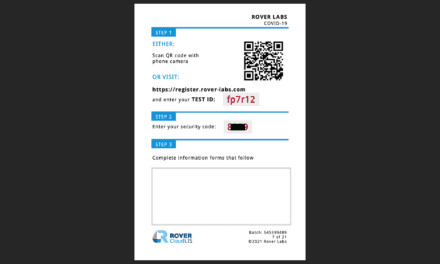Immunexpress, a molecular diagnostic company focused on improving outcomes for suspected sepsis patients, announced the publication of a study that validated the use of its SeptiCyte RAPID as a triaging tool for COVID-19 patients requiring hospitalization and potentially ICU care.
The study, “Evaluation of the host immune response assay SeptiCyte RAPID for potential triage of COVID-19 patients,” was published in Scientific Reports, a journal in the Nature portfolio and is available online.
“Since COVID-19 has the potential to advance quickly and cause dangerously low blood oxygen levels that require intensive care measures, the ability to appropriately and promptly triage patients is of the utmost importance. Due to the significant impact of COVID-19 cases on healthcare systems, tools like SeptiCyte RAPID, which can deliver results in less than an hour with little user engagement, may speed the triaging process and enhance patient outcomes,” says Juan P. Horcajada, MD, PhD, head of the department of Infectious Diseases at Hospital del Mar, Parc de Salut MAR, in Barcelona, Spain, and co-principal investigator of the study alongside co-principal investigator Dr. Beatriz Bellosillo, PhD, Head of Molecular Biology in the Pathology Department at Hospital del Mar.
SeptiCyte RAPID Study Details
The study was conducted at Hospital del Mar in Barcelona, a university hospital in Spain recognized as a pioneering center for healthcare, training and research. Samples were collected within 48 hours of intake from 146 patients who were hospitalized during July to December 2020 with proven SARS-CoV-2 infection and clinical signs of COVID-19 disease. Investigators evaluated SeptiCyte RAPID as a tool for determining COVID-19 severity and predicting the need for ICU admission. Retrospective clinical assessment was used as a comparator by classifying patients as having critical, severe, moderate, or mild COVID-19 under WHO guidelines.
“Given the recent reported commonalities in pathology and progression between COVID-19 and sepsis, we wanted to assess whether a sepsis stratification diagnostic tool like SeptiCyte RAPID could be useful to COVID-19 patients,” says Roy Davis, MD, PhD, MHA, Immunexpress’ CMO. “We were pleased to discover that SeptiCyte RAPID performed significantly better than routinely used single-biomarker assays for assessing COVID-19 severity. The study suggests that elevated SeptiScore values may potentially serve as indicators to increase patient monitoring and to identify patients at risk of ICU admission.”
SeptiCyte RAPID was able to stratify COVID cases according to these severity guidelines, with a discrimination power that was significantly better (by AUC or p-value) than conventional laboratory tests including CRP, lactate, creatine, IL-6, and D-dimer. Importantly, SeptiCyte RAPID, when drawn within 48 hours of intake, correctly discriminated critical or severe patients requiring later ICU admission from mild patients who did not need ICU care, with AUC and p values of 0.93 (p<0.0001) and 0.85 (p=0.0003) respectively. In a broader comparison, critical + severe patients who required later ICU care were compared to mild + moderate patients not requiring ICU care, with an AUC of 0.79 (p = 0.0001).
“Hospitals are in need of a rapid and accurate assessment of infectious disease severity for patient outcome and optimal intensive care capacity management,” says Rollie Carlson, PhD, CEO of Immunexpress. “With an infection-based disease like COVID-19 that has the potential to impede lung function and lower blood oxygen levels to dangerous levels at a startling rate, it is essential that patients are accurately triaged and monitored upon hospital intake. These data, along with SeptiCyte RAPID’s well validated clinical capacity for differentiating sepsis from non-infectious systemic inflammation host response syndromes, suggest that SeptiCyte RAPID may give emergency rooms a powerful tool to assess COVID-19 severity within one hour of obtaining a patient’s blood sample.”





